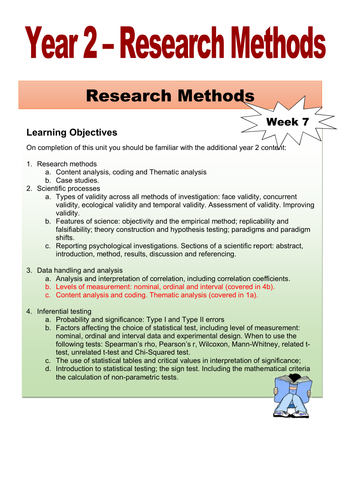
This workbook is an absolute must.
Written by leading authors Nick and Bethan Redshaw specifically for the AQA Psychology Specification Year 2 Psychology in Context, ISSUE, DEBATES and OPTIONS and builds on their highly successful year 1 material which is also available to download here on TES (Teacher reference - I have bought your Year 1 e-workbook, which I found to be amazing! )
Research Methods Year 2 Additional Content - Learning Objectives
On completion of this unit you should be familiar with the following:
Week 7 - Research methods
1. Research Methods
a. Content analysis, coding and Thematic analysis
b. Case studies.
2. Scientific processes
a. Types of validity across all methods of investigation: face validity, concurrent
validity, ecological validity and temporal validity. Assessment of validity. Improving
validity.
b. Features of science: objectivity and the empirical method; replicability and
falsifiability; theory construction and hypothesis testing; paradigms and paradigm
shifts.
c. Reporting psychological investigations. Sections of a scientific report: abstract,
introduction, method, results, discussion and referencing.
3. Data handling and analysis
a. Analysis and interpretation of correlation, including correlation coefficients.
b. Levels of measurement: nominal, ordinal and interval (covered in 4b).
c. Content analysis and coding. Thematic analysis (covered in 1a).
4. Inferential testing
a. Probability and significance: Type I and Type II errors
b. Factors affecting the choice of statistical test, including level of measurement: nominal, ordinal and interval data and experimental design. When to use the following tests: Spearman’s rho, Pearson’s r, Wilcoxon, Mann-Whitney, related t-test, unrelated t-test and Chi-Squared test.
c. The use of statistical tables and critical values in interpretation of significance;
d. Introduction to statistical testing; the sign test. Including the mathematical criteria the calculation of non-parametric tests
This workbook is an absolute must and will help your students achieve their potential in the NEW A Level Exams as well as saving you hours of preparation time. IDEAL for developing the flipped classroom. The supporting POWERPOINT(s) will also be available soon here on TES.
Our workbooks will also be supported by our Unique LIVE ONLINE AREA (Psychexamhelp). Students need to pay an additional subscription to receive LIVE help and exam performance feedback for more information go to our website at the right hand side of the page
Written by leading authors Nick and Bethan Redshaw specifically for the AQA Psychology Specification Year 2 Psychology in Context, ISSUE, DEBATES and OPTIONS and builds on their highly successful year 1 material which is also available to download here on TES (Teacher reference - I have bought your Year 1 e-workbook, which I found to be amazing! )
Research Methods Year 2 Additional Content - Learning Objectives
On completion of this unit you should be familiar with the following:
Week 7 - Research methods
1. Research Methods
a. Content analysis, coding and Thematic analysis
b. Case studies.
2. Scientific processes
a. Types of validity across all methods of investigation: face validity, concurrent
validity, ecological validity and temporal validity. Assessment of validity. Improving
validity.
b. Features of science: objectivity and the empirical method; replicability and
falsifiability; theory construction and hypothesis testing; paradigms and paradigm
shifts.
c. Reporting psychological investigations. Sections of a scientific report: abstract,
introduction, method, results, discussion and referencing.
3. Data handling and analysis
a. Analysis and interpretation of correlation, including correlation coefficients.
b. Levels of measurement: nominal, ordinal and interval (covered in 4b).
c. Content analysis and coding. Thematic analysis (covered in 1a).
4. Inferential testing
a. Probability and significance: Type I and Type II errors
b. Factors affecting the choice of statistical test, including level of measurement: nominal, ordinal and interval data and experimental design. When to use the following tests: Spearman’s rho, Pearson’s r, Wilcoxon, Mann-Whitney, related t-test, unrelated t-test and Chi-Squared test.
c. The use of statistical tables and critical values in interpretation of significance;
d. Introduction to statistical testing; the sign test. Including the mathematical criteria the calculation of non-parametric tests
This workbook is an absolute must and will help your students achieve their potential in the NEW A Level Exams as well as saving you hours of preparation time. IDEAL for developing the flipped classroom. The supporting POWERPOINT(s) will also be available soon here on TES.
Our workbooks will also be supported by our Unique LIVE ONLINE AREA (Psychexamhelp). Students need to pay an additional subscription to receive LIVE help and exam performance feedback for more information go to our website at the right hand side of the page
Something went wrong, please try again later.
Excellent resource-so useful for Y13 students as there are so few PPQs available. Is there a mark scheme to accompany this please?
Report this resourceto let us know if it violates our terms and conditions.
Our customer service team will review your report and will be in touch.
£8.50
